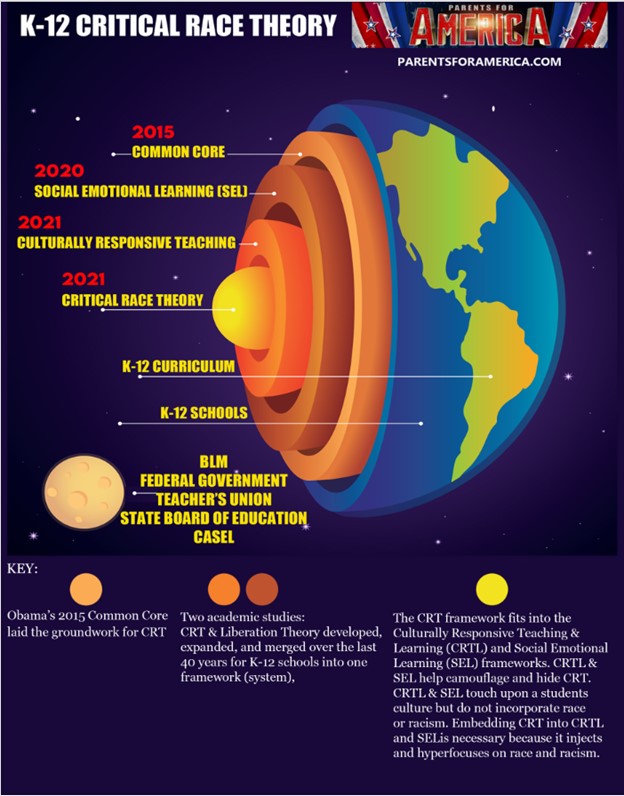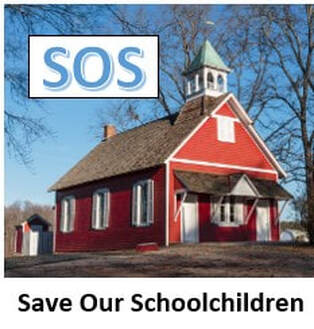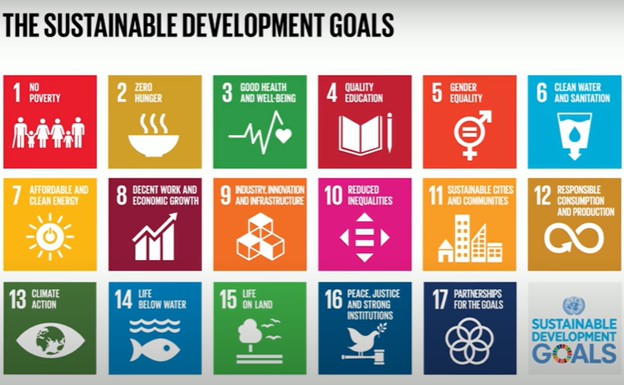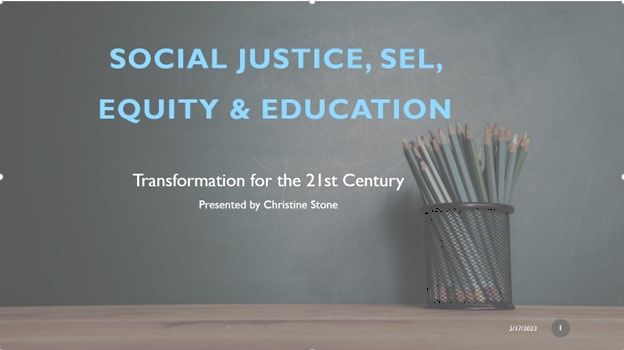Reigning Hope
Social Emotional Learning (SEL) in our Schools
It's easier to build strong children than it is to repair broken men.
Frederick Douglass
Frederick Douglass
|
| ||||||||||||
|
|
Social–emotional learning (SEL) is an educational method that aims to foster social and emotional skills within school curricula. SEL is also referred to as "socio-emotional learning" or "social–emotional literacy". In common practice, SEL emphasizes social and emotional skills to the same degree as other subjects, such as math, science, and reading. |
The application of SEL (and similar educational theories) within public schools has become increasingly controversial since 2020, especially within the United States.
SEL began in the 1960s at the Yale School of Medicine in its Child Study Center. There, Professor James Comer started the Comer School Development Program where he focused on the education systems of low-income African-American communities, particularly the elementary schools in New Haven, Connecticut due to their poor academic report cards
In 2019, the concept of Transformative Social and Emotional Learning (Transformative SEL, TSEL or T-SEL) was developed. Transformative SEL aims to guide students to "critically examine root causes of inequity, and to develop collaborative solutions that lead to personal, community, and societal well-being." In 2020, CASEL added information about Transformative SEL to its website, proclaiming it as their "updated definition of SEL".
SEL began in the 1960s at the Yale School of Medicine in its Child Study Center. There, Professor James Comer started the Comer School Development Program where he focused on the education systems of low-income African-American communities, particularly the elementary schools in New Haven, Connecticut due to their poor academic report cards
In 2019, the concept of Transformative Social and Emotional Learning (Transformative SEL, TSEL or T-SEL) was developed. Transformative SEL aims to guide students to "critically examine root causes of inequity, and to develop collaborative solutions that lead to personal, community, and societal well-being." In 2020, CASEL added information about Transformative SEL to its website, proclaiming it as their "updated definition of SEL".

John Klar: Moral brainwashing begins in Vermont | True North Reports
John Klar: Moral brainwashing in Vermont schools, Part 2 | True North Reports
Part 1: What is the WEF? Purpose Driven | Public Occurrences, Ep. 110
CASEL - is the big names in SEL education in the US.
John Klar: Moral brainwashing in Vermont schools, Part 2 | True North Reports
Part 1: What is the WEF? Purpose Driven | Public Occurrences, Ep. 110
CASEL - is the big names in SEL education in the US.
Below is information about SEL and the United Nations SDG workbook for k-12 classrooms.
Contributed by Christine Stone
These lesson plans were created by the National Education Association Foundation (NEAF), funded by NEA union dues. NEAF partnered with UNESCO and Harvard University (specifically Fernando Reimer, a Ford Foundation Fellow with a Harvard Graduate School education appointment.)
Link to all k-12 SDG lesson plans https://www.neafoundation.org/projects-initiatives/global-learning-resource-library/past-lesson-plans/
About Reimer: Reimer’s interest is empowering students to achieve the United Nations sustainable goals. He served on the UNESCO commission on the future of education that authorized the report titled “Reimaging Our Futures Together in a New Social Contract for Education”. I would like to point out the words “New Social Contract.
Reimer published multiple books about remaking education in the service of the United Nations. One such book is titled “Developing Teacher Professional Capacity to Educate Global Citizens through Collaborative Curriculum Design”. Reimer starts the book forward by referencing a World Economic Forum (WEF) paper on the major risks facing society. Dr. Reimer goes on to say that the 17 Sustainable Development Goals are the solution to the problems laid out by the WEF.
Reimer’s book states that by 2030 all Learners must acquire knowledge and skills for 100 percent compliance in promoting the Sustainable Development Goals (SDGs), as well as lifestyles, Human Rights, gender equality, promotion of a culture of peace and non-violence, global citizenship… (UNESCO 2019). The reference to Human Rights refers to the Declaration of Human Rights.
Contributed by Christine Stone
These lesson plans were created by the National Education Association Foundation (NEAF), funded by NEA union dues. NEAF partnered with UNESCO and Harvard University (specifically Fernando Reimer, a Ford Foundation Fellow with a Harvard Graduate School education appointment.)
Link to all k-12 SDG lesson plans https://www.neafoundation.org/projects-initiatives/global-learning-resource-library/past-lesson-plans/
About Reimer: Reimer’s interest is empowering students to achieve the United Nations sustainable goals. He served on the UNESCO commission on the future of education that authorized the report titled “Reimaging Our Futures Together in a New Social Contract for Education”. I would like to point out the words “New Social Contract.
Reimer published multiple books about remaking education in the service of the United Nations. One such book is titled “Developing Teacher Professional Capacity to Educate Global Citizens through Collaborative Curriculum Design”. Reimer starts the book forward by referencing a World Economic Forum (WEF) paper on the major risks facing society. Dr. Reimer goes on to say that the 17 Sustainable Development Goals are the solution to the problems laid out by the WEF.
Reimer’s book states that by 2030 all Learners must acquire knowledge and skills for 100 percent compliance in promoting the Sustainable Development Goals (SDGs), as well as lifestyles, Human Rights, gender equality, promotion of a culture of peace and non-violence, global citizenship… (UNESCO 2019). The reference to Human Rights refers to the Declaration of Human Rights.
1.25 min clip - https://sdgs.un.org/goals
Social-Emotional Learning: I recently became aware of an article published in the The Journal of Academic Policy by Ben Williamson. There is a charge to obtain this paper. Therefore, I have provided the link to the article and copied the article’s abstract below, and a link to Dr. James Lindsay’s podcast: The Dark Truth About Social Emotional Learning (SEL), where Lindsey reads Williamson’s paper, which starts at around the 3 hours and 30 into the podcast.
This is a 4-hour podcast, starting with a reading from “The Handbook of Social Emotional Learning” and Linda Darling Hammond. Then segways into a document published by the WEF, shifting to technology, Democratic Classroom, historical references, and other related topics to include the international organizations vested in using SEL as a tool for psychological economic and behavioral governance. These include the OECD, UNESCO, WEF, World Bank. Bill & Melinda Gate Foundationand others. Lindsey points out how these documents are connected in their intent, language, and stakeholders. Link: https://www.tandfonline.com/doi/full/10.1080/02680939.2019.1672895
SEL is being positioned as a proxy for socio economic value and socio economic governance.
Ultimately SEL has three functions:
- A thought reform tool to program children to function in the economy of the future as envisioned by the United Nations and WEF.
- A data mining operation via tech ed programs, wearable devices and AI to make children predictable and marketable consumers.
- A means to collect data to build out a new social infrastructure to manage, govern and control people.
Watch "Part 1: What is the WEF? Purpose Driven | Public Occurrences, Ep. 110" on YouTube
I have personal experience with ESG. As I previously worked for a large, global organization, which supported the new ESG financial model. These are two examples of how ESG is mandated down to employees:
1. Martin Luther King Day: A corporate announcement is made telling all employees to reach out to a black coworker to tell them how much you value them, regardless of if they had recently done anything to warrant the praise.
2. Hiring practices: Managers are told to only hire people based on diversity, not experience in the field in which they are being hired for. This is in violation of US employment laws and Civil Rights, as people in the US are not hired solely based on meeting diversity requirements. The outcome of these policies is that all women worked in my large unit (white, black, Indian and other races), some unqualified for their positions, which resulted in poor performance, and frustration on the part of the employees who received unsatisfactory performance appraisals.
ESG is being forced top down by the Biden administration to federal agencies via the federal acquisition process. I work in federal acquisitions and have recently seen two such proposals, both 10-year-contracts requiring compliance with ESG and Equity and their respective reporting requirements for federal agencies, which will then apply to the contractors awarded under these two large federal acquisitions. James O’Fallon does a great job explaining ESG. These proposals also had requirements around carbon tracking, reduction and reporting.
Abstract taken from Journal of Academic Policy titled, Psychodata: Disassembling the psychological, economic, and statistical infrastructure of ‘social-emotional learning’
Psychology and economics are powerful sources of expert knowledge in contemporary governance. Social and emotional learning (SEL) is becoming a priority in education policy in many parts of the world. Based on the enumeration of students’ ‘noncognitive’ skills, SEL consists of a ‘psycho-economic’ combination of psychometrics with economic analysis and is producing novel forms of statistical ‘psychodata’ about students. Constituted by an expanding infrastructure of technologies, metrics, people, money and policies, SEL has travelled transnationally through the advocacy of psychologists, economists, and behavioral scientists, with support from think tank coalitions, philanthropies, software companies, investment schemes, and international organizations. The article examines the emerging SEL infrastructure, identifying how psychological and economics experts are producing policy-relevant scientific knowledge and statistical psychodata to influence the direction of SEL policies. It examines how the OECD Study on Social and Emotional Skills, a large-scale computer-based assessment, makes ‘personality’ an international focus for policy intervention and ‘human capital’ formation, thereby translating measurable socio-emotional indicators into predicted socio-economic outcomes. The SEL measurement infrastructure instantiates psychological governance within education, one underpinned by a political rationality in which society is measured effectively through scientific fact-finding and subjects are managed effectively through psychological intervention.
Additional quotes from Williamson:
"SEL needs to be understood as part of a political economy in which the measurement of humans psycological attributes is seen as intergal to economic forcasting and the political management of populations."
"SEL interventions, practices and policies are the products of a combination of techniques, measures, and practices developed by psychological behavioral and economic experts or stakeholders."
This link will take you to H106 currently in the State House. click here It will give educators academic freedom to teach whatever they want - racism, gender idenity, SEL, white supremacy and repressed
|
In time these topics will all have active links and further information. If they are white click on it. Come back soon.
Battelle for Kids Panorama Education SEL BLM Flag SOS Slideshow SOS-Hope SOS Intro Page
Battelle for Kids Panorama Education SEL BLM Flag SOS Slideshow SOS-Hope SOS Intro Page
Proudly powered by Weebly


